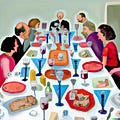One of my 2023 resolutions, as I launch into my 60s - but also upon returning to London after a year away - is to invest more attention and intention in the pillar of life that all the research shows is most key to human happiness: relationships. The past decades have been so busy with work, travel and family, that like many of you, I didn’t have much t…
Keep reading with a 7-day free trial
Subscribe to Elderberries to keep reading this post and get 7 days of free access to the full post archives.



